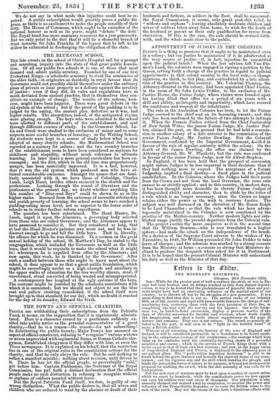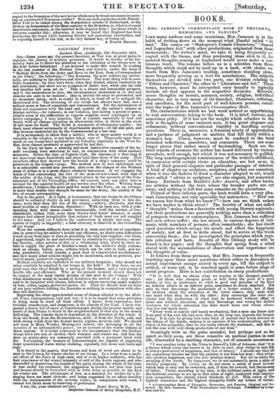Itttru to Of eititor.
THE HIGHLAND REGIMENTS.
Glasgow, 20th November 1854. SIR—While for the greater part of half-a-century the strife of war in Eu- rope had been hushed, and its tidings reached us only from distant depend- encies, it was to be feared that the predominance of peaceful ideas and pur- suits might have had an enervating influence on the martial spirit of our country, to be thrown off but by the struggles of a new generation. It is a great thing to find that this is not so. The serried ranks of our infantry still, as of old, receive and repel with immoveable firmness the charge of out- numbering foes, scattering them with the fatal precision of their fire, or completing the rout with the war-cry and the bayonet. Our noble horse- men too, in band-to-hand encounters, display a prowess worthy of the days of chivalry renowned for knights and warriors, whose deeds kindle the imagination, and shed a lustre almost superhuman on the page of history and romance. That race is not extinct. The sword, so grandly al- luded to by the poet, is still seen to be " light in the terrible hand" of many a British soldier.
Without at all detracting from the bravery of the sons of England and Ireland, it will be considered pardonable in a Scotchman to be found exult- ing in the conspicuous courage of his countrymen,—the courage which bore them up for centuries amid the constantly-recurring onsets of a powerful neighbour and enemy ; which in the service of French Kings shone with a lustre equal to that of their own best warriors; and now, in the happy union of long-divided England and France, is displayed to the admiring gaze of our gallant allies. The " perfervidum ingenium Scotorum" is still to be found behind the grave features and beneath the stalwart forms of our coun- trymen ; and the vigorous arm and the skill which handles the plough, and bends the intractable forces of nature to its purpose, is found not inadequately prepared for wielding the sword, while the dire necessity of war calls for its interposition.
But the new race of warriors must be bred upon a surface of square miles which we count by hundreds, while the semibarbaric power we now oppose can raise his soldiers over vast areas of thousands. Our population is also annually thinned and drained away by emigration, to increase the power and influence of the Transatlantic Republic, or to carry the British name to the ends of the earth. May not the excess of this have a disastrous effects with regard to the formation of the new levies which may be found necessary in carry- ing on a protracted European conflict? How are such regiments as the Ninety- third Foot to be raised among the depopulated straths of Sutherland, or the broken-up homesteads of the Iteay country or the Hebrides, or, what is of equal importanceationally, in the deserted fields of green Erin ? Let those whom it concerns consider this; otherwise, it may be found that England has been paralyzing the heart while fostering distant and precarious extremities, and so exposing herself to the risk, at no very distant day, of losing all. A Nonni Barron.



























 Previous page
Previous page